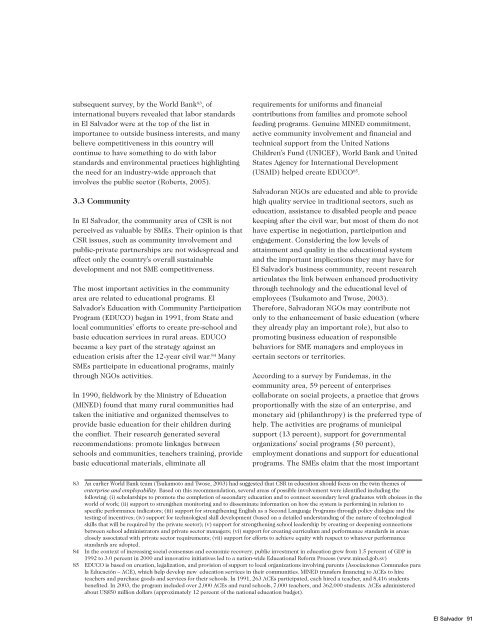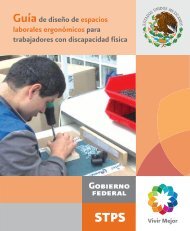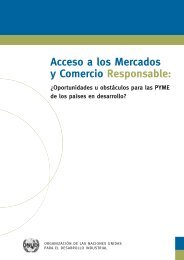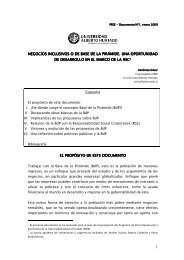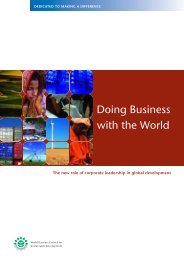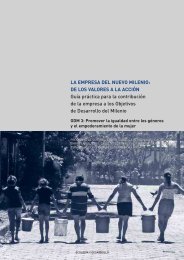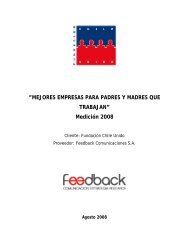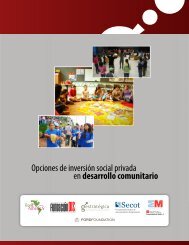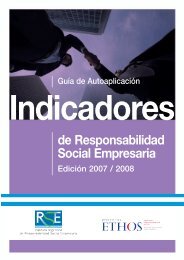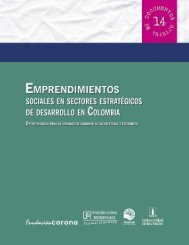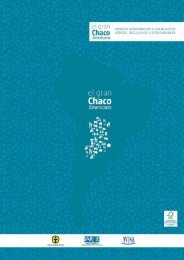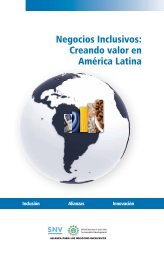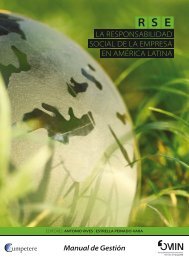3.1 MarketplaceIn El Salvador SMEs do not perceive <strong>the</strong>marketplace area as valuable for <strong>the</strong>ir businesscompetitiveness. Their general view is thatmarketplace issues related <strong>to</strong> CSR, such ascompliance, quality assurance, supply chainmanagement, and management capacities mayaffect <strong>the</strong> overall economic growth, but not SMEcompetitiveness in <strong>the</strong> mid- <strong>to</strong> long-term. ManySMEs still believe that ethical behaviors arephilanthropic and not linked <strong>to</strong> <strong>the</strong> enterprise’spr<strong>of</strong>itability and growth. On <strong>the</strong> o<strong>the</strong>r hand, a fewSMEs in exporting sec<strong>to</strong>rs (such as clothing andmanufacturing) started including CSR in <strong>the</strong>ircompetitiveness drivers because <strong>of</strong> cus<strong>to</strong>merdemand, mainly <strong>the</strong> USA. In particular, CSR issuesaffect SMEs’ competitiveness when SMEs are part <strong>of</strong>a supply chain, which <strong>foster</strong>s better managementcapacities and may increase exports if <strong>the</strong> supplychain is international.The marketplace area <strong>of</strong>fers several opportunitiesthat may help SMEs grow, such as strong interestand investments from MDIs and valuablegovernment efforts. Some <strong>of</strong> <strong>the</strong>se opportunities are:<strong>the</strong> practical skills <strong>of</strong> SME owners and managers and<strong>the</strong> capability <strong>of</strong> formal SMEs <strong>to</strong> create jobs andincome. CSR could start <strong>to</strong> be considered a moreimportant issue that is able <strong>to</strong> affect SMEscompetitiveness in <strong>the</strong> mid-term. It can assureethical behavior and proper governance conditions -which are prerequisites for partnerships with largedomestic and international companies, MDIs andgovernmental institutions- and can provide fundsand additional incentives for responsible SMEs.Salvadoran SMEs lack resources, governancecapacity, management culture and implementation<strong>of</strong> voluntary management systems, such as ISOstandards (Vives, Corral and Isusi, 2005). The ISOsurvey 2005 shows that <strong>the</strong>re are only 49enterprises ISO 9001 certified in El Salvador.However, some interesting CSR initiatives are inplace. Among those is <strong>the</strong> au<strong>to</strong>-evaluationquestionnaire created by Fundemas <strong>to</strong> help SMEsmoni<strong>to</strong>ring <strong>the</strong>ir engagement in CSRimplementation. The evaluation is structured in away that allows SMEs <strong>to</strong> analyze activities in eachCSR area. In addition, <strong>the</strong> Ministries <strong>of</strong> Economy,Labor and Environment are working on CSR withthree key sec<strong>to</strong>rs in <strong>the</strong> country: apparel, c<strong>of</strong>fee andsugar. For example, a CSR project with <strong>the</strong> sugarsec<strong>to</strong>r is working <strong>to</strong> develop new strategies withcommunities and stakeholders <strong>to</strong> produce sugar in asustainable way. 81According <strong>to</strong> a survey implemented by Fundemas,76 percent <strong>of</strong> enterprises interviewed choosesuppliers on <strong>the</strong> basis <strong>of</strong> quality, price, terms <strong>of</strong>delivery and 96 percent demonstrated a preference<strong>to</strong> work with national suppliers. Most enterpriseshave programs <strong>to</strong> improve <strong>the</strong>ir products andservices, particularly large and medium enterprises.Conversely, only 25 percent <strong>of</strong> enterprises,generally large enterprises, take care <strong>of</strong> cus<strong>to</strong>mers’claims, and only 40 percent have a formalcommunication policy; 89 percent verify whe<strong>the</strong>r<strong>the</strong> communication campaign complies withlegislation for cus<strong>to</strong>mer protection (Fundemas, 2004).3.2 WorkplaceIn El Salvador, SMEs do not perceive <strong>the</strong> workplacearea as valuable for <strong>the</strong>ir operations. Their view isthat CSR issues, such as employment policies, childlabor rights, health and safety, gender policies, andcompliance may affect <strong>the</strong> overall sustainabledevelopment, but not necessarily SME pr<strong>of</strong>itability.To improve local employees’ education and enhance<strong>the</strong>ir CSR expertise, some activities have beenlaunched. The World Bank became involved with ElSalvador when <strong>the</strong> local Ministry <strong>of</strong> Economy askedfor help with CSR education, hoping <strong>to</strong> improvelabor standards and environmental practices. 82 A81 The sugar cane, c<strong>of</strong>fee, and corn industries in El Salvador provide <strong>the</strong> most important exports and involve almost 6percent <strong>of</strong> <strong>the</strong> nationalpopulation. The sugar cane growers were trying <strong>to</strong> get higher prices and pay workers a lower wage. Arias says <strong>the</strong>y now distribute <strong>the</strong>income on a better basis with 54.5percent <strong>of</strong> <strong>the</strong> <strong>to</strong>tal income going <strong>to</strong> <strong>the</strong> growers and <strong>the</strong> rest <strong>to</strong> <strong>the</strong> mills. The partnership has proved <strong>to</strong>be an excellent way for encouraging responsible business practices among <strong>the</strong> growers and mills (Roberts 2005).82 As well as evaluating <strong>the</strong> c<strong>of</strong>fee and apparel sec<strong>to</strong>rs <strong>of</strong> <strong>the</strong> business community <strong>the</strong>re.90 <strong>Recommended</strong> <strong>actions</strong> <strong>to</strong> <strong>foster</strong> <strong>the</strong> <strong>adoption</strong> <strong>of</strong> <strong>Corporate</strong> <strong>Social</strong> Responsibility (CSR) practices in Small and Medium Enterprises (SMEs)
subsequent survey, by <strong>the</strong> World Bank 83 , <strong>of</strong>international buyers revealed that labor standardsin El Salvador were at <strong>the</strong> <strong>to</strong>p <strong>of</strong> <strong>the</strong> list inimportance <strong>to</strong> outside business interests, and manybelieve competitiveness in this country willcontinue <strong>to</strong> have something <strong>to</strong> do with laborstandards and environmental practices highlighting<strong>the</strong> need for an industry-wide approach thatinvolves <strong>the</strong> public sec<strong>to</strong>r (Roberts, 2005).3.3 CommunityIn El Salvador, <strong>the</strong> community area <strong>of</strong> CSR is notperceived as valuable by SMEs. Their opinion is thatCSR issues, such as community involvement andpublic-private partnerships are not widespread andaffect only <strong>the</strong> country’s overall sustainabledevelopment and not SME competitiveness.The most important activities in <strong>the</strong> communityarea are related <strong>to</strong> educational programs. ElSalvador’s Education with Community ParticipationProgram (EDUCO) began in 1991, from State andlocal communities’ efforts <strong>to</strong> create pre-school andbasic education services in rural areas. EDUCObecame a key part <strong>of</strong> <strong>the</strong> strategy against aneducation crisis after <strong>the</strong> 12-year civil war. 84 ManySMEs participate in educational programs, mainlythrough NGOs activities.In 1990, fieldwork by <strong>the</strong> Ministry <strong>of</strong> Education(MINED) found that many rural communities hadtaken <strong>the</strong> initiative and organized <strong>the</strong>mselves <strong>to</strong>provide basic education for <strong>the</strong>ir children during<strong>the</strong> conflict. Their research generated severalrecommendations: promote linkages betweenschools and communities, teachers training, providebasic educational materials, eliminate allrequirements for uniforms and financialcontributions from families and promote schoolfeeding programs. Genuine MINED commitment,active community involvement and financial andtechnical support from <strong>the</strong> United NationsChildren’s Fund (UNICEF), World Bank and UnitedStates Agency for International Development(USAID) helped create EDUCO 85 .Salvadoran NGOs are educated and able <strong>to</strong> providehigh quality service in traditional sec<strong>to</strong>rs, such aseducation, assistance <strong>to</strong> disabled people and peacekeeping after <strong>the</strong> civil war, but most <strong>of</strong> <strong>the</strong>m do nothave expertise in negotiation, participation andengagement. Considering <strong>the</strong> low levels <strong>of</strong>attainment and quality in <strong>the</strong> educational systemand <strong>the</strong> important implications <strong>the</strong>y may have forEl Salvador’s business community, recent researcharticulates <strong>the</strong> link between enhanced productivitythrough technology and <strong>the</strong> educational level <strong>of</strong>employees (Tsukamo<strong>to</strong> and Twose, 2003).Therefore, Salvadoran NGOs may contribute no<strong>to</strong>nly <strong>to</strong> <strong>the</strong> enhancement <strong>of</strong> basic education (where<strong>the</strong>y already play an important role), but also <strong>to</strong>promoting business education <strong>of</strong> responsiblebehaviors for SME managers and employees incertain sec<strong>to</strong>rs or terri<strong>to</strong>ries.According <strong>to</strong> a survey by Fundemas, in <strong>the</strong>community area, 59 percent <strong>of</strong> enterprisescollaborate on social projects, a practice that growsproportionally with <strong>the</strong> size <strong>of</strong> an enterprise, andmonetary aid (philanthropy) is <strong>the</strong> preferred type <strong>of</strong>help. The activities are programs <strong>of</strong> municipalsupport (13 percent), support for governmentalorganizations’ social programs (50 percent),employment donations and support for educationalprograms. The SMEs claim that <strong>the</strong> most important83 An earlier World Bank team (Tsukamo<strong>to</strong> and Twose, 2003) had suggested that CSR in education should focus on <strong>the</strong> twin <strong>the</strong>mes <strong>of</strong>enterprise and employability. Based on this recommendation, several areas <strong>of</strong> possible involvement were identified including <strong>the</strong>following: (i) scholarships <strong>to</strong> promote <strong>the</strong> completion <strong>of</strong> secondary education and <strong>to</strong> connect secondary level graduates with choices in <strong>the</strong>world <strong>of</strong> work; (ii) support <strong>to</strong> streng<strong>the</strong>n moni<strong>to</strong>ring and <strong>to</strong> disseminate information on how <strong>the</strong> system is performing in relation <strong>to</strong>specific performance indica<strong>to</strong>rs; (iii) support for streng<strong>the</strong>ning English as a Second Language Programs through policy dialogue and <strong>the</strong>testing <strong>of</strong> incentives; (iv) support for technological skill development (based on a detailed understanding <strong>of</strong> <strong>the</strong> nature <strong>of</strong> technologicalskills that will be required by <strong>the</strong> private sec<strong>to</strong>r); (v) support for streng<strong>the</strong>ning school leadership by creating or deepening connectionsbetween school administra<strong>to</strong>rs and private sec<strong>to</strong>r managers; (vi) support for creating curriculum and performance standards in areasclosely associated with private sec<strong>to</strong>r requirements; (vii) support for efforts <strong>to</strong> achieve equity with respect <strong>to</strong> whatever performancestandards are adopted.84 In <strong>the</strong> context <strong>of</strong> increasing social consensus and economic recovery, public investment in education grew from 1.5 percent <strong>of</strong> GDP in1992 <strong>to</strong> 3.0 percent in 2000 and innovative initiatives led <strong>to</strong> a nation-wide Educational Reform Process (www.mined.gob.sv)85 EDUCO is based on creation, legalization, and provision <strong>of</strong> support <strong>to</strong> local organizations involving parents (Asociaciones Comunales parala Educación – ACE), which help develop new education services in <strong>the</strong>ir communities. MINED transfers financing <strong>to</strong> ACEs <strong>to</strong> hireteachers and purchase goods and services for <strong>the</strong>ir schools. In 1991, 263 ACEs participated, each hired a teacher, and 8,416 studentsbenefited. In 2003, <strong>the</strong> program included over 2,000 ACEs and rural schools, 7,000 teachers, and 362,000 students. ACEs administeredabout US$50 million dollars (approximately 12 percent <strong>of</strong> <strong>the</strong> national education budget).El Salvador 91
- Page 1 and 2:
Recommended actionsto foster the ad
- Page 3 and 4:
Recommended actionsto foster the ad
- Page 5 and 6:
table of contentsI Acknowledgements
- Page 7:
Chapter 6: Mexico1 Executive Summar
- Page 10 and 11:
acronymsCDMCSRECFLAFSCGDPGHGGRIHRWI
- Page 12 and 13:
strong internal relationship, in ot
- Page 14 and 15:
programs that affect the private se
- Page 16 and 17:
Section Four - Recommended Actions
- Page 18 and 19:
(Technology Index, Public Instituti
- Page 20 and 21:
BibliographyESADE, SDA Bocconi, Nor
- Page 22 and 23:
The following chart shows competiti
- Page 24 and 25:
CSR area significanceThe following
- Page 26 and 27:
structured philanthropic policies,
- Page 28 and 29:
the private sector and to develop g
- Page 30 and 31:
c. Facilitating, recommended action
- Page 32 and 33:
BibliographyAnselmi, P. (2005) ‘L
- Page 34 and 35:
APPENDIX 1 - ARGENTINA’S STAKEHOL
- Page 36 and 37:
28 Recommended actions to foster th
- Page 38 and 39:
2 Economic and SocialFrameworkBrazi
- Page 40 and 41:
3 Current State of CSRThe concept o
- Page 42 and 43:
micro and small companies based on
- Page 44 and 45:
Brazil ratified the Kyoto Protocol
- Page 46 and 47:
- Improve monitoring systems andenv
- Page 48 and 49: e. Endorsing, recommended actions f
- Page 50 and 51: Websites consultedwww.accountabilit
- Page 52 and 53: APPENDIX 1 - BRAZIL’S STAKEHOLDER
- Page 54 and 55: APPENDIX 1 - BRAZIL’S STAKEHOLDER
- Page 56 and 57: A stable macroeconomic framework, s
- Page 58 and 59: An investigation of Chile’s equit
- Page 60 and 61: CSR area significanceThe following
- Page 62 and 63: powerful, but are mainly involved i
- Page 64 and 65: Fomento al Desarrollo Científico y
- Page 66 and 67: a. Improving Promotion and Advocacy
- Page 68 and 69: Websites consultedwww.accionrse.clw
- Page 70 and 71: APPENDIX 1 - CHILEAN STAKEHOLDER MA
- Page 73 and 74: Chapter 4: Colombia1 Executive Summ
- Page 75 and 76: In addition, corruption is a widely
- Page 77 and 78: CSR area significancesupply chain m
- Page 79 and 80: However, market pressures, primaril
- Page 81 and 82: - Sponsor a human rights campaign t
- Page 83 and 84: . Improving Promotion and Advocacy,
- Page 85 and 86: Websites consultedwww.accountabilit
- Page 87 and 88: APPENDIX 1 - COLOMBIAN STAKEHOLDER
- Page 89 and 90: APPENDIX 1 - COLOMBIAN STAKEHOLDER
- Page 91 and 92: Chapter 5: El Salvador1 Executive S
- Page 93 and 94: El Salvador’s competitiveness. Co
- Page 95 and 96: ecome key organizations in the batt
- Page 97: According to Vives, Corral and Isus
- Page 101 and 102: following strategies, as defined in
- Page 103 and 104: 4.4 Civil SocietyIn this study, civ
- Page 105 and 106: Tsukamoto, M, Twose, N., (2003) ‘
- Page 107 and 108: APPENDIX 1 - EL SALVADOR’S STAKEH
- Page 109 and 110: Chapter 6: Mexico1 Executive Summar
- Page 111 and 112: OrganizationWEFWEFWEFIndexNumber of
- Page 113 and 114: there is a general confusion about
- Page 115 and 116: CSR area significancemaxCSR actual
- Page 117 and 118: and because of institutional voids
- Page 119 and 120: - Improve monitoring systems andenv
- Page 121 and 122: - Participate in the publication of
- Page 123 and 124: López-Acevedo, G., (2006) ‘Mexic
- Page 125 and 126: AppendixThe following stakeholder m
- Page 127: APPENDIX 1 - MEXICAN STAKEHOLDER MA
- Page 130 and 131: Peruvian civil society has a strong
- Page 132 and 133: environment, and they have waste tr
- Page 134 and 135: Not even the lack of relations and
- Page 136 and 137: - Create awareness of accountabilit
- Page 138 and 139: These two groups will likely implem
- Page 140 and 141: Websites consultedwww.accountabilit
- Page 142 and 143: APPENDIX 1 - PERUVIAN STAKEHOLDER M
- Page 145 and 146: Chapter 8: Venezuela1 Executive Sum
- Page 147 and 148: OrganizationWEFIndexNumber of Count
- Page 149 and 150:
3 Current State of CSRCSR actual po
- Page 151 and 152:
cooperatives and farmers 114 Unfort
- Page 153 and 154:
a. Mandating, recommended actions f
- Page 155 and 156:
BibliographyArmas, V. (1999) ‘Esp
- Page 157:
AppendixThe following stakeholder m


